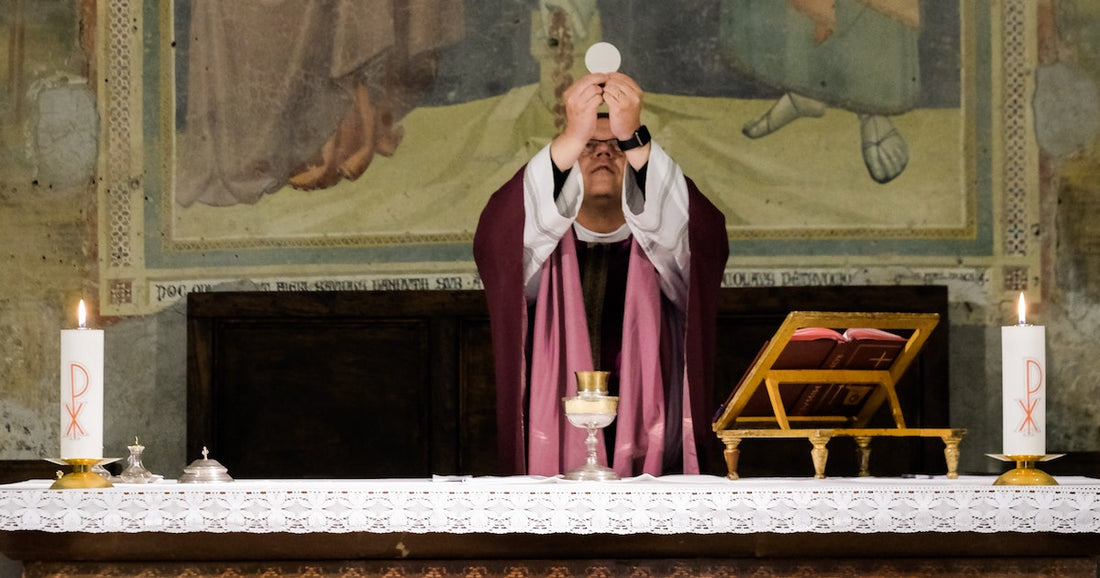
Making Every Holy Communion Count
Dr. Edward SriDo we really see a difference in our lives every time we receive Jesus in Holy Communion? It can be easy to receive the Eucharist frequently without realizing the power it can have in our lives. Today, Dr. Sri explains the Biblical roots of Holy Communion to help us appreciate it better, and walk away changed every time we receive Jesus at Mass.
It can be easy to receive the Eucharist frequently without realizing the power it can have in our lives. Let us never forget that when we receive the Eucharist, we receive God himself.
Biblical Roots of Communion Meal
Throughout the Old Testament, we see that every animal sacrifice for the atonement of sins was accompanied by a communion meal and the strengthening of the covenantal friendship between Israel and God. The animal sacrifice was not enough for God, he wanted a communion meal because it symbolized sharing of life and covenant friendship between God and his people. More than the sacrifice, God wanted the hearts of his people. We also see in Scripture that a communion meal established peace and unity. Partaking in the communion meal was therefore a necessary part after the entire ritual of animal sacrifice for the forgiveness of sins. The fact that at passover the Jews would not only sacrifice a lamb, but also eat it, is crucial because it points to the Eucharist.
The Eucharist: The New Paschal Lamb
Cleanse out the old leaven that you may be a new lump, as you really are unleavened. For Christ, our paschal lamb, has been sacrificed. Let us, therefore, celebrate the festival, not with the old leaven, the leaven of malice and evil, but with the unleavened bread of sincerity and truth.
-1 Corinthians 5:7-8
And he took bread, and when he had given thanks he broke it and gave it to them, saying, “This is my body which is given for you. Do this in remembrance of me.” And likewise the cup after supper, saying, “This cup which is poured out for you is the new covenant in my blood.
- Luke 22:19-20
The Eucharist is the Body, Blood, Soul and Divinity of Jesus Christ. When we receive the Eucharist, we receive God himself. This reality should profoundly impact and transform us. At the Last Supper, Jesus takes the sacrificial language of the passover and applies to himself. He not only offers his physical body up to the Father for the forgiveness of our sins, but also commands us to eat of his body and drink of his blood. He also says that his blood will be poured out for the forgiveness of sins just as the blood of the lamb at passover was poured on the altar for the forgiveness of sins. When we receive the Eucharist, we receive Jesus himself and Jesus frees us from the bondage of sin. The Eucharist thus becomes the new communion meal which bonds us in deep friendship with God. In the Bible, the body represents the whole person, therefore in the sacrifice of the Mass Jesus’ whole life is offered up to the Father for us. In addition, not only do we receive Jesus in the Eucharist but Jesus also receives us into himself. As we receive the Eucharist, we are taken out of ourselves and assimilated into Christ so that we begin to take on his virtues and character. Therefore, receiving the Eucharist is an extremely sacred moment during Mass that we should be present to.
Practicals
- Contemplate the meaning and the reality of the Eucharist every time you go to mass.
- Let Jesus welcome you as you are when you receive him and savor the moments of prayer after communion. Don’t look around at other people or find other distractions, try to be present to Jesus.
- Take a few minutes after mass to thank Jesus for the Eucharist.
Resources
- Visit Dr. Sri’s website at www.edwardsri.com and to book online events with Dr. Sri email events.edwardsri@gmail.com
- Subscribe to our show by texting “allthingscatholic” to 33-777
- Find more of Dr. Sri’s episodes at ascensionpress.com/allthingscatholic
- A Biblical Walk Through the Mass by Dr. Sri
- Ascension is pleased to offer our new and improved online bible study programs and sacramental preparation programs digitally to help you minister with flexibility. Go to ascensionpress.com to view all our offerings!